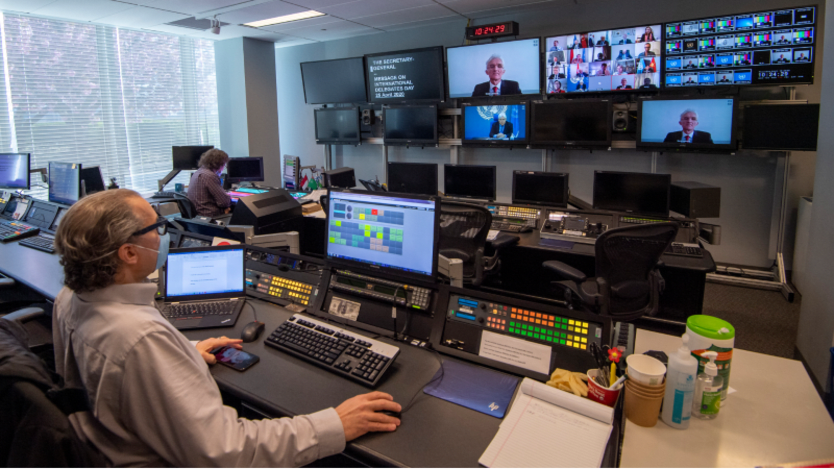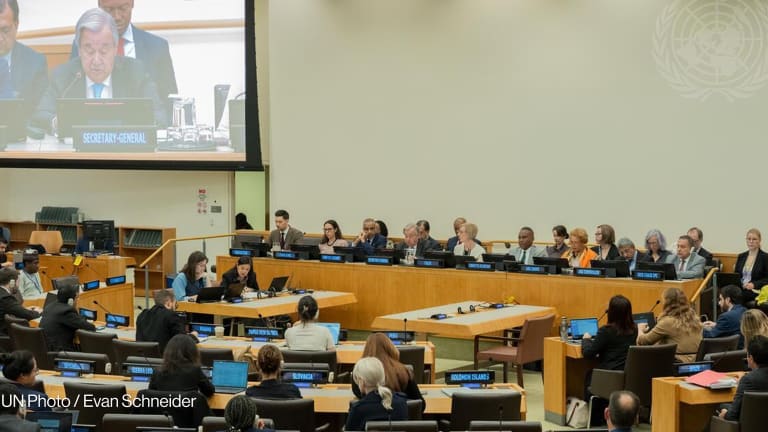
NEW YORK — The United Nations rapidly shifted to conduct all work virtually last month as the COVID-19 pandemic spread. But the transition from large conference rooms to Zoom meetings has been bumpy, U.N. observers say, and raises transparency concerns that could change how the U.N. works once it reopens its doors.
Some routine U.N. Secretariat meetings hosted by U.N. agencies and member states are still hosted online, but are not virtually accessible to the public. The U.N. Headquarters’ weekly public calendar, typically filled with events in New York and Geneva, now often only shows the daily virtual media briefing.
► The rise of remote working in global development
“It has been weird, it has been crazy, and in a lot of ways just unprecedented,” said John Romano, coordinator of the Transparency, Accountability, and Participation Network in New York. “I can sympathize with them. In a lot of ways, it is really tough. But the bare minimum we have been expecting is that they show what they have been doing and what are the outcomes of some of these discussions.”
The General Assembly has so far postponed negotiations or approved routine agreements with few “meaningful changes to the text,” according to David Andrés Viñas, a policy and advocacy expert with Save the Children in New York. The U.N. Security Council began hosting public online meetings last week, following civil society pressure.
“Having lots of those side events and meetings are how you give voice to civil society organizations, and how you shape the agenda and try to push a dialogue forward. All of that is not happening at the moment, so we need to find ways of ensuring that this work continues while social distancing is required,” Viñas said.
Some of the challenges with a large, multilateral institution working virtually are technical. The security council has not yet found a solution to conducting real-time translation during virtual meetings, for example, making it impossible to hold official meetings where formal resolutions are adopted. Some member states have expressed concerns about their video or audio cutting out mid-speech.
“The worst thing that can happen is member states do things in isolation and behind closed doors.”
— John Romano, coordinator, Transparency, Accountability, and Participation NetworkSome member states, though, have also politicized elements of working remotely, according to Richard Gowan, U.N. director at the International Crisis Group. He said that despite some initial “hiccups,” most of the U.N.’s daily work has now resumed.
“The U.N.'s virtual meeting technology was not really ready for this transition at first, but some of the problems were political too. Russia resolutely refused to accept online voting in the security council, for example, meaning that the council now has an unwieldy written voting system,” Gowan told Devex.
The council, which has been holding unofficial meetings, is conducting remote votes during a 24-hour voting period, followed by three hours to provide written statements.
“It is worth keeping in mind that many U.N. diplomats are pretty conservative and wary of giving up the in-person diplomacy that greases the wheels of U.N. deal-making,” Gowan continued.
United Nations: A tipping point
► Is the UN ready to face the future?
► DevExplains: What's going on with UN reform?
► With 'digital transformation,' UNDP seeks to stay relevant and add value
The council’s voting process, which is in place until the end of April, could become increasingly complicated as the council is set to hold meetings on contentious issues in the next few months, such as a resolution on cross-border access into Syria, according to Viñas. Save the Children was among the development and aid organizations that have called on the council to broadcast open meetings and increase transparency.
“That is the trick — they are not considered formal meetings, but in all effect they are as formal as they can go,” Viñas said.
“So far, they have only voted on resolutions that are not contentious and have agreed to renew peacekeeping missions. In July, we expect the cross-border resolution on Syria to be quite contentious and the system wouldn't work. They are trying to figure out as they go what would work,” Viñas continued.
The annual U.N. high-level political forum, where member states present their progress on the Sustainable Development Goals, is also scheduled for July in New York. The U.N. has not yet announced how it will conduct the HLPF, leaving some civil society organizations questioning how they can contribute.
“They have not been very vocal on how things will be unfolding in the next months. Regarding the HLPF, they have not come out with any solutions,” said Jessica Erbrard, a policy and advocacy official at Transparency International. “Will civil society have time to adapt if they keep withholding the information? It is also possible that they don’t know.”
It is likely that the HLPF will look similar to the Commission on the Status of Women event in March, which was reduced to a “bare minimum,” one-day virtual session of member state and U.N. speeches, observers say.
“The HLPF forum negotiations before the process was fairly opaque to begin with, and did not have outlets for civil society engagement. Once things started to take a turn and shut down around the U.N., it became almost nonexistent,” Romano said.
One civil society concern is that states won’t follow through on reporting their SDG progress. Romano said he hopes that non-emergency discussions and events can be deferred at the U.N. for as long as necessary.
“The worst thing that can happen is member states do things in isolation and behind closed doors. The U.N. is based on precedent and this sets a pretty bad precedent if member states go behind closed doors and negotiate on things without, at the bare minimum, engaging with non-state actors,” Romano said.
Even when social distancing measures are loosened, Gowan and other experts said they think the transition to remote events and conversations could carry over. It is a cheaper option, and also could allow for more public engagement — if conducted correctly.
“I do think that the U.N. will rely on remote meetings more after the pandemic. After all, meeting virtually offers opportunities to integrate U.N. officials in the field and headquarters into real-time conversations,” Gowan said.
But that doesn’t mean it will be a popular option.
“Nobody wants to create a precedent for holding more remote meetings after the pandemic passes. After all, if the Security Council can conduct all its business online, why should governments pay to keep ambassadors in expensive apartments in Manhattan at all?” Gowan said.
Search for articles
Most Read
- 1
- 2
- 3
- 4
- 5








